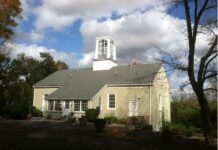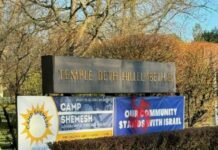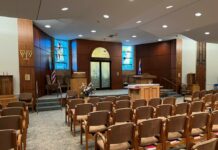
Congregation Leyv Ha-Ir is a Reconstructionist synagogue with no property, no programming for school-age children, a part-time rabbi and suggested but not mandatory dues. But the Center City community is nonetheless a formal one along the lines of a traditional synagogue, according to Rabbi Julie Greenberg. It just caters to a different type of congregant.
“It’s a Jewish community for adults who want Jewish community for themselves,” Greenberg said. “Not because they need a bar or bat mitzvah for their offspring.”
In most cases, they don’t even have offspring, according to the rabbi. There are around 85 individual members in Leyv Ha-Ir. On occasion, congregants will bring their grandchildren to High Holiday services. Other than that, children do not really appear at congregational events.
Some members have already raised families. Others never had kids in the first place. Most are empty nesters over 60 who live close enough to Leyv Ha-Ir’s Rittenhouse Square meeting rooms.
Membership lengths range from one year to five years to 10 years to 33 years, dating to the synagogue’s founding in 1990. On High Holidays, Greenberg leads services in the First Unitarian Church of Philadelphia, and hundreds of people attend for free. And each year, new congregants join the community. The rabbi said that Leyv Ha-Ir’s congregation and endowment are bigger than they’ve ever been. In the era of hybrid services, some members have joined from California and Massachusetts.
“Our people take soup to each other, give each other rides to doctor’s appointments and send birthday cards to each other,” said Greenberg. “It’s a very caring community.”
Leyv Ha-Ir was founded by women who had been “excluded from even touching a Torah” in other Jewish communities, the rabbi said. While the community has always had a spiritual leader, with Greenberg serving as the third, it also maintained that lay-led spirit. Members organize minyans and book groups, among other activities. Once a month, Greenberg leads a Shabbat service. Every other weekend, congregants take control.
And the rabbi prefers it that way. Like a member, she just enjoys seeing people multiple times a week. She’s part of a Wednesday morning Zoom session about heavy topics like coping with memory loss. Every week, the topic is different, and the 15-25 people who attend really talk.
“You’re not anonymous in this community,” Greenberg said.
Bobbi Cohen, the synagogue’s president, joined in 2000 after a friend told her about it. As she started attending services and other events, Cohen connected with the Reconstructionist experience. She liked the emphasis on music and the openness of the rabbi at the time, Rayzel Raphael, who allowed members to “question things as they were taught,” Cohen recalled.

For the first time in her adult life, the single woman felt like she belonged in a shul. While living in Marlton and Mount Laurel in South Jersey, Cohen tested out a few synagogues. But she could tell that they were places for families with kids.
Leyv Ha-Ir felt open to anyone.
“It was more casual, and casual in terms of the way people dressed. People would sometimes interrupt the rabbi to ask a question. If people were singing a song, you could make a suggestion as to what you would sing,” she said. “Everybody is a participant. It felt right.”
At first, Cohen commuted to Center City for shul activities. But she was considering a move into the city anyway, and the synagogue made her decision easier. She moved to Center City and became an official member around the same time that Greenberg started.
“I said if I move into Center City and like the new rabbi, there would be no question that I would join,” Cohen recalled.
As Greenberg put it, despite its lack of property, children and a full-time rabbi, Leyv Ha-Ir is “thriving.” It has more members and money than ever, yes, and, of course, that’s nice. But it’s not even about that, according to the rabbi.
It’s about living Jewishly without the pressure of maintaining the business of a synagogue.
“We are a link in the chain of continuity meeting the needs of people in this community. The purpose of Judaism is to be a vehicle for the flow of Jewish wisdom and spiritual connection into the world,” she explained. “As long as we are doing that and people find meaning in that, there will be Jewish continuity.”






